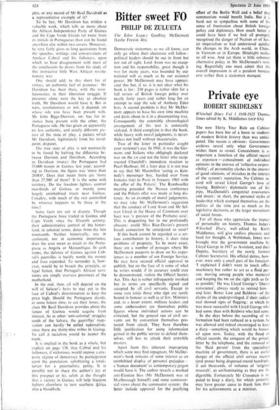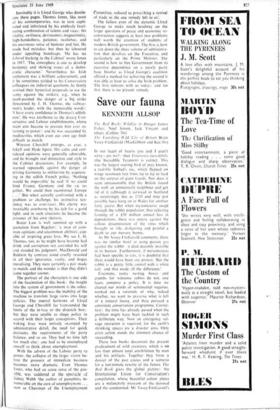Private eye
ROBERT SKIDELSKY
Whitehall Diary Vol 1 1916-1925 Thomas Jones edited by K. Middlemas (out 63s) The new Thirty Year Rule on Cabinet papers has been less of a boon to students of modern British history than was antici- pated. The reason is obvious: Government archives reveal only what Government wishes them to reveal. Concealment is as important a function of the official record as exposure — concealment of individual opinions in the interest of 'collective respon- sibility', of personality clashes in the interest of good relations, of mistakes in the interest of the system's reputation. No Cabinet re- cord will reveal Lloyd George's love of teasing, Baldwin's diplomatic use of his pipe, MacDonald's congenital evasiveness and deceit: in short, the personal styles of leadership which stamped themselves on the politics of the time just as much as the legislative decisions, or the larger movement of social forces.
For all those who appreciate the impact of personality on history, Thomas Jones's Whitehall Diary, well edited by Keith Middlemas, will give endless pleasure and food for thought. A Welshman, Jones was brought into the government machine by Lloyd George in 1917 as Assistant, and then Deputy, Secretary of the newly formed Cabinet Secretariat. His official duties, how- ever, were only a small part of his function. 'I explained I didn't want to touch office machinery but rather to act as a fluid per- son, moving among people who mattered and keeping the PM on the right path so far as possible.' He was Lloyd George's 'liberal conscience', always ready to remind him— and later, Bonar Law and Baldwin—of the claims of the underprivileged, if their radical zeal showed signs of flagging: at which he was more successful with Lloyd George who had some. than with Baldwin who had none.
In the days before the recording of in- formation had been reduced to a system. he was allowed and indeed encouraged to keep a diary—something which would be frown- ed upon now. Today, with the flood 01 official records, the conquest of the privat. letter by the telephone, and the removal ot the 'fluid person' from the specialised machine of government, there is an awful danger of the official civil service record (and prose) being dispersed round hundreds. if not thousands, of volumes of 'original research', as unilluminating as they are in- digestible. Fortunately gr Crossman is re- puted to keep a diary, for which posterity may have greater cause to thank him than for his achievements as a minister.
Inevitably it is Lloyd George who domin- ates these .pages. Thomas Jones, like most of his contemporaries, was in turn capti- vated and infuriated by his endlessly fasci- nating combination of talents and vices: his vitality, swiftness, deviousness, magnanimity,
high-handedness, patience, resilience, and his enormous sense of humour and fun. He made bad mistakes, but then he laboured under appalling handicaps. 'He has no Liberal backing in the Cabinet' wrote Jones in 1917. 'The atmosphere is one to develop hesitancy and shirking issues of a demo- cratic character.' Nevertheless his Irish
settlement was a brilliant achievement, and if he sometimes yielded to his Conservative colleagues on industrial questions, he firmly resisted their hysterical proposals to use the army against the strikers, e.g., when he pooh-poohed the- danger of a big strike threatened by J. H. Thomas, the railway- men's leader, with the memorable words: 'I have every confidence in Thomas's selfish- ness'. He was anathema to the dreary Con- servative and Labour establishments, whose main aim became to prevent him ever re- turning to power: and he was succeeded by mediocrities which even our own age finds difficult to match.
Winston Churchill emerges, as ever, a Jekyll and Hyde figure. His calm and con- sidered opinions were generally admirable, and he brought real distinction and style to the Cabinet discussions. For example, he warned repeatedly against the danger of driving Germany to militarism by acquiesc- ing in the selfish French policy. 'Nothing would be impossible' he said 'if we could bind France, Germany and the ux to- gether. We could then reconstruct Europe . .' But when actually confronted with a problem or challenge, his instinctive ten- dency was to over-react. His clarity was invariably overborne by his itch for a good fight; and in such situations he became the prisoner of his own rhetoric.
Bodar Law is well summed up with a quotation from Bagehot: 'a man of com- mon opinions and uncommon abilities', cap-
able of inspiring great love. We see J. H. Thomas, too, as he might have become had
drink and corruption not corroded his will and clouded his judgment. MacDonald and Baldwin by contrast stand cruelly revealed in all their ignorance, vanity, and bogus moralising. They were certainly a pair made to match, and the wonder is that they didn't come together sooner.
The portrait of the characters is one side of the fascination of this book: the insight into the system of government is the other.
The biggest problem was the inability of the machine to translate large views into large policies. The mental horizons of Lloyd George and Churchill far transcended the limits of the in-tray or the dispatch box: but they were unable to shape policy to accord with their larger conceptions. Their waking lives were entirely swamped by administrative detail, the need for quick decisions, the requirements of the party balance, and so on. They had no time left for much else: one had to be unemployed oneself to think about unemployment.
With the advent of the Labour party to power, the collapse of the larger vision be- fore the pressure of immediate business becomes more dramatic. Even Thomas Jones, who had an acute sense of the pos- sible, was saddened at the spectacle of Sidney Webb 'the author of pamphlets in- numerable on the cure of unemployment ... now as Chairman of the Unemployment Committee, reduced to prescribing a revival of trade as the one remedy left to us'.
The failure even of the dynamic Lloyd George to make much headway on the larger questions of peace and economic re- construction suggests at least two problems well worth the attention of students of modern British government. The first is how to cut down the sheer volume of administra- tion that devolves on the Executive, and particularly on the Prime Minister. The second is how to free Government from its excessive dependence on a purely party base. Insofar as Lloyd George's coalition offered a method for achieving the second it was able at least to solve the Irish problem. The first remains with us today: and for that there is no present remedy.







































 Previous page
Previous page